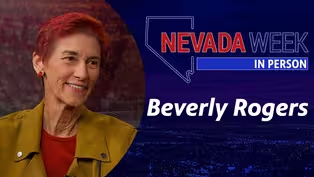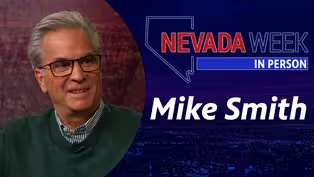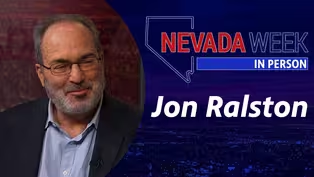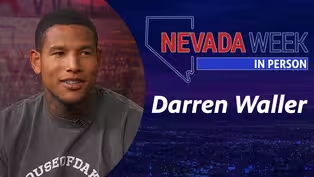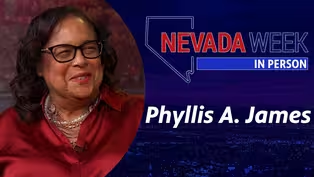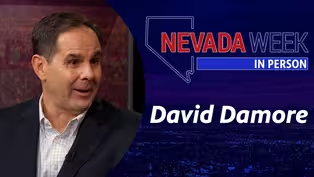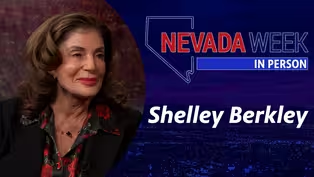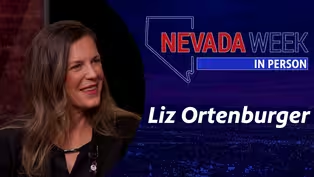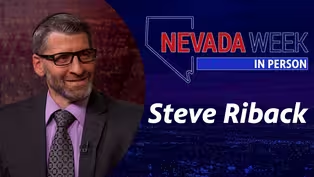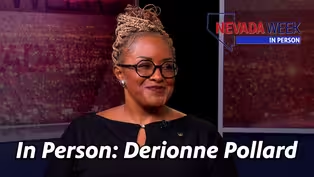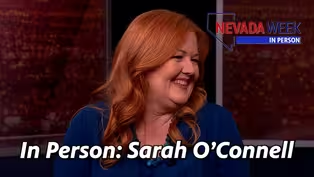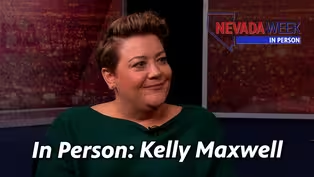
Nevada Week In Person | Heidi Kyser
Season 1 Episode 10 | 14mVideo has Closed Captions
A one-on-one interview with longtime journalist Heidi Kyser.
We talk with Southern Nevada journalist Heidi Kyser about her time reporting on stories from around the region.
Problems playing video? | Closed Captioning Feedback
Problems playing video? | Closed Captioning Feedback
Nevada Week In Person is a local public television program presented by Vegas PBS

Nevada Week In Person | Heidi Kyser
Season 1 Episode 10 | 14mVideo has Closed Captions
We talk with Southern Nevada journalist Heidi Kyser about her time reporting on stories from around the region.
Problems playing video? | Closed Captioning Feedback
How to Watch Nevada Week In Person
Nevada Week In Person is available to stream on pbs.org and the free PBS App, available on iPhone, Apple TV, Android TV, Android smartphones, Amazon Fire TV, Amazon Fire Tablet, Roku, Samsung Smart TV, and Vizio.
Providing Support for PBS.org
Learn Moreabout PBS online sponsorshipMore from This Collection
Nevada Week In Person goes beyond the roundtable discussion of Nevada Week with guests for a more casual conversation about their personal passions, new projects and compelling stories that are overlooked in the flurry of the news cycle.
Nevada Week In Person | Beverly Rogers
Video has Closed Captions
One-on-one interview with Rogers Foundation chair Beverly Rogers. (14m)
Nevada Week In Person | Mike Smith
Video has Closed Captions
One-on-one interview with Las Vegas Sun political cartoonist Mike Smith. (14m)
Nevada Week In Person | Jon Ralston
Video has Closed Captions
One-on-one interview with The Nevada Independent CEO Jon Ralston. (14m)
Nevada Week In Person | Darren Waller
Video has Closed Captions
One-on-one interview with Las Vegas Raider tight end Darren Waller. (14m)
Nevada Week In Person | Phyllis A. James
Video has Closed Captions
One-on-one interview Phyllis A. James. (14m)
Nevada Week In Person | David Damore
Video has Closed Captions
One-on-one interview with Chair of the Department of Political Science at UNLV David Damor (14m)
Nevada Week In Person | Shelley Berkley
Video has Closed Captions
One-on-one interview Senior Vice President for Touro University Shelley Berkley. (14m)
Nevada Week In Person | Liz Ortenburger
Video has Closed Captions
One-on-one interview with SafeNest CEO Liz Ortenburger. (14m)
Nevada Week In Person | Steve Riback
Video has Closed Captions
One-on-one interview with Las Vegas Metro Police Lieutenant Steve Riback. (14m)
Nevada Week In Person | DeRionne Pollard
Video has Closed Captions
One-on-one interview Nevada State College President DeRionne Pollard. (14m)
Nevada Week In Person | Sarah O’Connell
Video has Closed Captions
One-on-one interview with Director of Eat More Art LLC Sarah O’Connell. (14m)
Nevada Week In Person | Kelly Maxwell
Video has Closed Captions
One-on-one interview with Baby’s Bounty Executive Director Kelly Maxwell. (14m)
Providing Support for PBS.org
Learn Moreabout PBS online sponsorshipThere are a lot of stories to tell about Southern Nevada.
Well, this week on Nevada Week In Person, we talk to a journalist who has been telling those stories for well over a decade.
♪♪♪ Support for Nevada Week In Person is provided by Senator William H. Hernstadt and additional supporting sponsors.
(Kipp Ortenburger) Southern Nevada is fertile ground for journalists; there are seemingly endless stories to tell and topics to explore.
Well, Heidi Kyser has been bringing those important and impactful stories to readers and listeners for more than a decade.
She is the deputy editor of the Desert Companion magazine, and she is a producer for Nevada Public Radio.
Heidi, welcome.
-Thank you so much for having me, Kipp.
-And I just want to say the editor role is new for you.
You've usually done a lot more reporting, and now you're kind of moving into that role.
(Heidi Kyser) Yes, that's right; and in fact, as deputy editor of Desert Companion, I will not be producing unfortunately for KNPR anymore but hopefully still working on some podcast projects.
-I was hoping-- I'm glad you brought that up-- because I was hoping we could talk a little bit of inside baseball here.
I only know television, I don't know radio, you have the experience.
I know you have some television experience in your background as well but you've also been on Nevada Week numerous times.
I mean, what's one of the differences really?
I mean, are there stark contrasts between how you prepare a show like State of Nevada, which we have to remember is every single day, five days a week and ours is only once a week.
But beyond that are there some big differences?
-There are big differences there.
Mainly for me as a writer, there are big differences in the writing which I learned the hard way.
But other than that, you know, journalism has commonalities across media.
So a lot of what you do in preparation for this show, I did in preparation for producing episodes of State of Nevada and also did for producing episodes of the podcasts that we did, and it's very similar to the type of reporting and research that you do for written journalism, print journalism and online journalism as well.
-Let's talk a little bit about that writing then.
I mentioned in the intro that Las Vegas is fertile ground for writing here.
You have such extensive experience in writing.
I mean, is there a key ingredient that is different about writing here in Las Vegas than maybe some of the other places that you've written and covered?
-Definitely.
Las Vegas is just such an interesting place to work as a journalist, as you know, and such an interesting place to write about.
It does have that small-world phenomenon which makes it easy to find very interesting people, which I know you like to feature in your work as well, and you can get-- you can build a personal rapport with people here much more quickly.
Well, you can find very interesting stories more easily, I feel.
You're not lost in the shuffle of a huge population, a vast number of publications or productions, and then you have a community that's very receptive to that type of writing, that type of work.
You know, they really want to know about their fellow Las Vegans and what's going on, whether it be with food or the environment, you know, the entertainment scene or the legislature.
People are very hungry for more information.
As you know we don't have a very large news media universe here, so everything we have is treasured, I find.
-We don't, and you would think that if we have such a small media universe that accessibility to some of the heads of state, so to speak, would be limited but it doesn't seem to be that way here.
We've talked about this on In Person a lot.
The accessibility we seem to have to not only our legislators but even some of our entertainers, and even a show like State of Nevada, a lot of times on my morning commute, I'm surprised at some of the celebrities that you have on a show like that.
-Yes.
Being the Southern Nevada affiliate of NPR and having that cachet-- pardon me-- having that profile definitely encourages-- it helps us to, you know, call people and it encourages them to pick up the phone.
People like NPR just like they like PBS, and they want to support it.
They want to be on our air.
They want to be in the pages of our magazine because they know it's reaching other readers and listeners like them.
-Yes.
I want to come back to the Nevada Week episode we did.
We talked about kind of some of the biggest stories in the future and where we're going.
Of course we had four panelists around.
We don't always get to take a deep dive into stories.
I want to ask you, is there anything we left off the table that was really important to you that you covered in 2021?
-Definitely.
I had the opportunity this year, and starting in 2020 actually, to work on KNPR's first podcast production called "Native Nevada" which focused on Indigenous issues and Indigenous peoples in the state, and it was a very rewarding experience, a very educational experience for me.
The first thing that I did as producer was enlist a team of Native Nevadans to guide the content, to help me understand what was important to them, and I tried to take as humble a stance as I could in working with them and provide the platform for the voices they felt were important to amplify and the issues they felt were important to amplify, and it just ended up being an incredibly enriching and educating experience for me.
-Did you find-- because we've covered Indigenous issues on the show before, and I personally have gone out and I've talked to tribal leaders and things, there's a reticence there to open up to you sometimes because of that trust factor so much.
I mean, did you run into that barrier, and then, you know, if you did, what kind of turned the tables a little bit to be able to get the more intimate conversations that you were looking for?
-Sure.
I mean, that medium as trust is well deserved on our part.
Indigenous people have been badly abused by the news media over, you know, hundreds of years and by the government obviously, so yes, there were some tribes that never did return our calls or emails and didn't want to talk to us at all.
The folks who were generous enough to share their stories and be interviewed on record, those relationships came very organically.
You know, we began by just reaching out and talking to them.
Some of them were people the assistant producers or the host, all of whom are Indigenous, already knew members of their communities or, you know, friends of friends, so we just built networks like that.
But I did rely very heavily on the production team for that.
-Issues that you covered in that series, anything that really rises to the top of something that maybe really surprised you and really kind of stuck with you?
-Well, I was really surprised by how coincidental I guess, I don't want to use the word "serendipitous" because it's horrible issues, but the timing of some of the episodes that we worked on.
For instance while we were covering-- or while we were researching the episode that we did about K-12 education, the mass grave sites in the boarding schools in Canada were discovered, and we were interviewing Bobbi Rahder, the executive director of the museum at the Stewart Indian School in Carson at that time, and we were producing that episode as that was happening.
So we happened to be talking about the boarding school issue just at the right time, for lack of a better word.
Similar with the missing and murdered Indigenous persons episode that we did, we were working on that as the Gabby Petito disappearance was playing out in the national media, and Indigenous people were being very outspoken and saying why are we paying so much attention to this one missing white woman when there are thousands of Indigenous people who are missing all over the world and we're paying no attention to that whatsoever?
So yes, that was a very interesting coincidence.
-Yes.
Let's go back to the Stewart School.
We've heard Governor Sisolak recently issue a public apology for what the school was.
I don't even know if it's talk, there's an expectation we're going to find similar maybe mass burial sites there.
This is an issue that is going to stick with us.
I'm sure it's going to cause a lot of pain.
I mean, I'm hoping this will be something that NPR will be covering in the future, or is this continuing?
-Oh, definitely, yes, and KNPR has a relationship, has an agreement with the Mountain West News Bureau, and they have reporters who are focusing on this story.
We just had a report about Governor Sisolak's apology, and then they also, I believe, broke the news here in Southern Nevada that 200 unmarked graves were identified at the Stewart Indian School cemetery.
But yes, those Indigenous issues, not just in Northern Nevada, not just at Carson and not just having to do with boarding schools but all over the state, are going to continue to be top of mind for us.
-Which is a good thing, and it comes back to the Indigenous disappearances too.
I don't want to take emphasis off of that too.
As you mentioned, maybe more attention because of the Gabby Petito issue.
I'm hoping so.
I'm hoping there's more attention to this issue.
-Now, it's very interesting.
You know, non-native people are beginning to think about things that native people have been trying to call attention to for decades, and I'm sure that, you know, the Native reporters and journalists that I've worked with and researchers are very glad that attention is finally there, that the attention is finally on MMIP.
But then it's such a-- it must be such a strange feeling, you know.
At the same time you're sort of thinking like man, it took you a long time.
You know, now?
Because of Gabby Petito, now you're going to pay attention to this?
So yes, I think we have so many more issues to surface and bring to light that we haven't paid attention to.
-I want to switch gears a little bit.
I want to talk about Las Vegas in general.
As we were talking before the show, we share very similar places we've lived prior to coming here, both on the East Coast, both in Southern California as well before we came to Las Vegas.
the first question I have for you is what brought you to Las Vegas-- and we also have lived abroad as well.
What brought you to Las Vegas originally?
-I was covering the Vegas beat for a convention industry magazine, and I was coming here a lot, like at least once a month, sometimes twice a month, and so I finally-- I had a love interest, so I finally asked my editor, why don't I just move there and I'll set up a remote.
So I guess I telecommuted.
You know, I did the WFH thing before or WF--yes, WFH, work from home, before it was cool, and then I just ended up staying.
-So that was my second question.
I mean, just ended up staying because you liked it?
-I ended up marrying that same love interest, and he's very rooted here.
He has two children here and, you know, I got great opportunities professionally.
-Yes.
You live in Downtown, right, or around Downtown?
-Yes.
-So I want to talk a little bit about that.
I mean, Downtown has been through this really interesting transformation.
We've seen a lot of beautification, a lot of reorganization of Downtown, and then we have the death of Tony Hsieh also heavily impacted by that area, and I think where the area was going, maybe talk a little about that.
I mean, the influence of Tony Hsieh is still prevalent.
So many of the boarded buildings that Hsieh had owned, what do you think the future of those are going to be?
-Yes, that's a really-- we think about this and talk about this Downtown a lot.
I've been here 17 years, and that entire time I've lived Downtown.
My husband owns a small business that he's had Downtown for 12 years, and the passing of Tony Hsieh was really tragic and really felt by the many people who moved Downtown because of him either because of him personally or because of his professional vision, his, you know, redevelopment efforts.
But I do also feel that what had started before him, the revitalization that had started before him and has continued since his unfortunate death is going to keep going.
What's happening in the Arts District right now is a good example of that if you just look at Main Street or First Street.
Those areas are just booming, and I think that will continue.
I think that his legacy is always going to be a very, you know, melancholy one and sort of happy, mixed feeling.
You know, people, we gained a lot from him being here, but it was such a sad way for that to end.
-A sad way to end, yes, but as you mentioned, hopefully a legacy and we'll see some of those properties develop.
We have just a couple seconds left.
I want to go to just a really quick question.
I was doing some research on you.
You do yoga.
-Yes.
-So here's a good one.
The best location outside to do yoga.
-You mean in the outdoors?
-Yes.
-Oh, gosh.
I guess Red Rock.
-Okay.
A true Las Vegas experience is... -The Las Vegas Paiute Powwow at the Mormon Fort.
-Wow, I got to check that out.
I want to see that.
Thank you so much, Heidi, we appreciate it.
-You're welcome.
-Thank you, Heidi.
To see an in-depth conversation with Heidi and other local journalists about the top stories of 2021, go to our website, vegaspbs.org/nevadaweek or tune in on Sunday at 5:30 p.m. and Tuesday at 7:30 p.m.

- News and Public Affairs

Top journalists deliver compelling original analysis of the hour's headlines.

- News and Public Affairs

FRONTLINE is investigative journalism that questions, explains and changes our world.












Support for PBS provided by:
Nevada Week In Person is a local public television program presented by Vegas PBS
